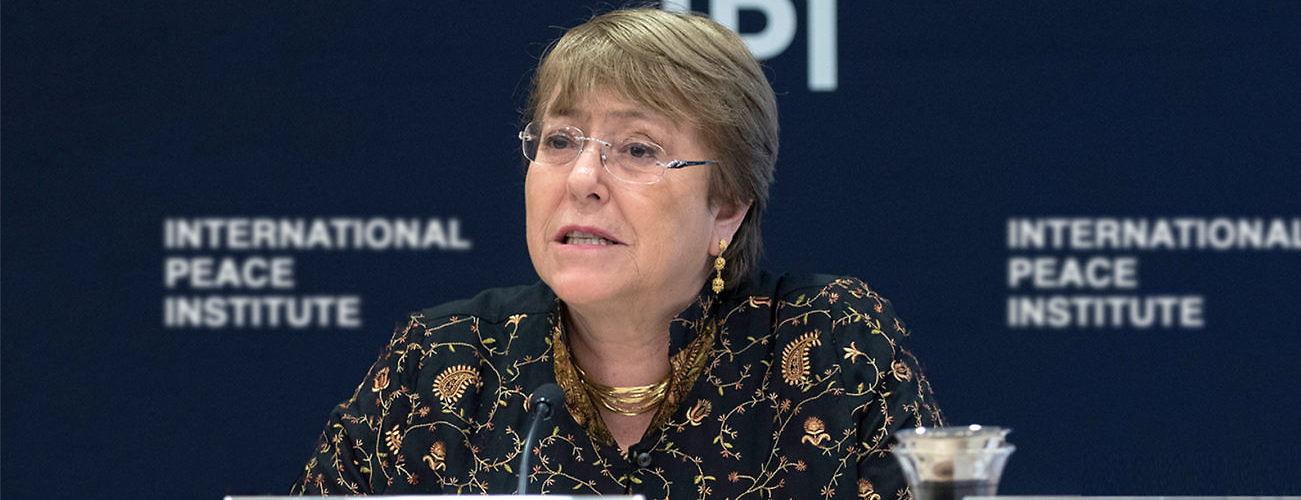“We are witnessing widespread efforts to silence and delegitimize, specifically targeted at women human rights defenders,” Michelle Bachelet, the new United Nations High Commissioner for Human Rights, told a September 27th forum at IPI on human rights defenders.
In one of her first public appearances since becoming High Commissioner three weeks earlier, Ms. Bachelet, the former President of Chile, said that human rights defenders, particularly those representing women, gender equality and LGBT interests, were facing smear campaigns, harassment, intimidation, physical attacks, arrest, and often the “added consequence” of sexual violence.
Her suggestion on how to respond was defiant. “Don’t give up,” she said. “Push back, and put the Declaration of Human Rights on the agenda and in the system in a stronger way.”
The setting was the annual Trygve Lie Symposium on Fundamental Freedoms, co-sponsored by IPI and the Norwegian Ministry of Foreign Affairs, and entitled this year: “Human Rights Defenders: A Global Movement for Peace.” IPI President Terje Rød-Larsen welcomed the crowd, noting that the year 2018 marks the 70th anniversary of the UN Declaration of Human Rights and the 20th anniversary of the UN Declaration on Human Rights Defenders.
Norwegian Foreign Minister Ine Eriksen Søreide introduced the conversation, lamenting the fact that human rights defenders were themselves being put on the defensive.
“I never thought in 2018 that I would take the stage and talk about defending the achievements we have made instead of moving forward on a progressive agenda to include more rights and expand rights,” she said. “We are sliding back on the human rights agenda, unfortunately. There is shrinking space for the Declaration of Human Rights defenders, and instead of sharing information and learning from and copying each other, worst practices are being shared instead of the best.”
She called on lawyers, journalists, trade activists, international rights organizations, and other advocates and their supporters to push back. “These trends have to be reversed,” she said. “We have to fight back, expand and strengthen the democratic space and reach out to existing groups to forge new processes.”
Thomas Hughes, the Executive Director of Article 19, which promotes freedom of information and expression, pointed out that counterterrorism laws are being widely used against rights defenders. “And states are often interpreting security and rights as something to be balanced, rather than as rights promoting security and underpinning security,” he said.
He stipulated that the rise of the internet was both helpful and harmful to rights advocates. “There has been a massive boon and benefit for human rights defenders in the open, decentralized nature of the internet,” he said, “but this is accompanied, of course, by the spread of hate speech online, by greater digital surveillance and by governments to tracking and harassing human rights defenders.” As a result, he reasoned, the coming debate would be about controlling content, who would do it and by what standards.
Florence Simbiri Jaoko, Special Envoy for the Global Alliance of National Human Rights Institutions (GANHRI) argued that in keeping with the SDGs, states had the obligation of providing data on the number of killings and kidnappings and instances of torture used against journalists and trade unionists and other rights advocates. Referring to the number of General Assembly and Security Council resolutions about protecting rights defenders, she stated, “These resolutions must be benchmarks to hold states accountable.”
Several speakers spoke of the good example for civil society involvement set by Tunisia, and the country’s foreign minister, Khemaies Jhinaoui, recalled that in 2015, Tunisian civil society won the Nobel Peace Prize for its contribution to promoting dialogue and consensus. “The inextricable link between respect for the Declaration of Human Rights, sustaining peace, and development are a cornerstone of the 2030 development agenda with a main and major objective of leaving no one behind,” he said.
Calling attention to the dangers faced by human rights advocates, Ms. Eriksen Søreide recounted the grim statistic that 1119 of them in 61 countries had been killed between 2015 and 2017. “Every day, human rights activists across the globe show extraordinary courage,” she said. “For our part, we have to defend the defenders.”
IPI President Terje Rød- Larsen moderated the discussion.








